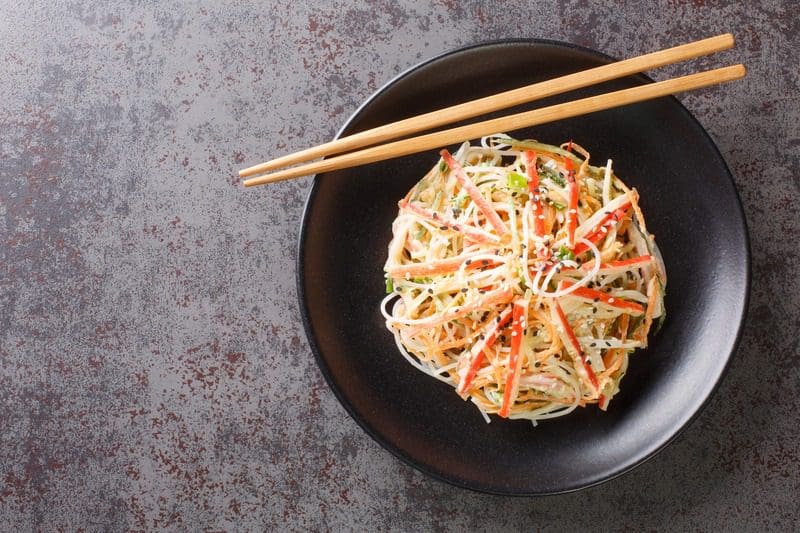Imitation crab (surimi) serves as the backbone of this mayonnaise-based seafood
salad. Fresh herbs such as dill and parsley add some freshness to the dish, and
some lemon zest and lemon juice help cut some of the richness.
Imitation crab (surimi) serves as the backbone of this mayonnaise-based seafoodsalad. Fresh herbs such as dill and parsley add some freshness to the dish, andsome lemon zest and lemon juice help cut some of the richness.
- 1 shallot (finely minced)
- 1 stalk celery (small dice)
- 1 carrot (small dice)
- Zest of 1 lemon
- Juice of ½ lemon
- 16 oz 1 lb imitation crab meat, cut into ½” bite-sized pieces
- ½ cup mayonnaise
- ½ tsp Kosher salt
- ¼ tsp Freshly-ground black pepper
- ¼ tsp red pepper flakes
- ¼ tsp ground cayenne pepper
- 2 Tbsp fresh dill (finely chopped)
- 2 Tbsp fresh parsley (finely chopped)
- 2 Tbsp fresh chives (finely sliced)
Finely mince the shallot, and set it aside in a large mixing bowl.
Add the diced celery and carrot to the mixing bowl with the shallot, along with the lemon zest and lemon juice.
Add the pieces of imitation crab meat, in addition to the mayonnaise, Kosher salt, Freshly-ground black pepper, red pepper flakes, ground cayenne pepper, fresh dill, parsley, and sliced chives.
Taste, and add Kosher salt, freshly-ground black pepper, or lemon juice if desired.
You can take imitation crab and mix it with whatever you like—It goes great with salads. I often combine the surimi with Asian-inspired ingredients such as ginger, garlic, scallions, soy sauce, and sesame oil if I’m trying to make a version of this salad that excludes mayonnaise. But I love the mayonnaise-based version too!
If you have some extra imitation crab and are looking for another fun recipe, check out the recipe on this website for Crab Rangoon—wontons stuffed with imitation crab, cream cheese, and scallions!
There is a famous Boston-based chef and restauranteur named Tom Colicchio, who is probably most recognized for his participation in Bravo’s show “Top Chef”. I learned how to cut chives from a guy who learned how to cut chives from Mr. Colicchio. His method was to fold a single piece of paper towel into a narrow strip roughly ¾ inches wide, wet it slightly, and then wrap the chives you have on one end tightly using the wet paper towel. Not sure if Colicchio still cuts his chives like that, but I like the method—It helps hold everything together when you are trying to slice the chives as finely as possible.
